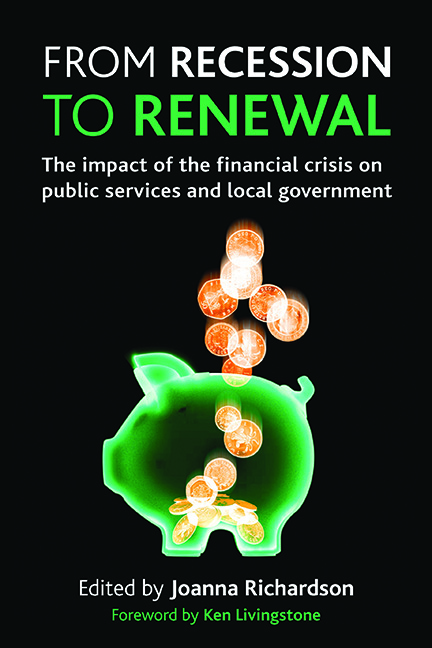 From Recession to Renewal
From Recession to Renewal seven - Efficiencies in public service delivery
Published online by Cambridge University Press: 01 September 2022
Summary
Introduction
The ‘efficiencies’ debate in political discourse, alluded to already in this book, imagines there to be a number of ‘back-office’ activities that can be cut without impacting on ‘front-line’ services. Perhaps what is needed, though, is a more radical overhaul of the design and delivery of public services. The aim of this chapter is to show how an ideological approach to managing the public sector has driven it in the wrong direction. Between 1999 and 2009, public services received a 55% real-terms funding increase, as financed by an increase of 5% of GDP in public expenditure. This investment was not matched by improvement: public sector productivity fell by 3.4%, compared to the private sector's 27.9% productivity gain over the same period (Blond, 2009). At the same time, the instruments of ‘deliverology’ (Barber, 2007) were invented and forced upon the public sector with the aim of reforming public services and delivering improved results. The financial crisis and the consequent fiscal deficit inherited by the Conservative- Liberal coalition government of 2010 made the levels of public service expenditure of the last decade no longer affordable: indeed, within days of coming to power, the new government announced plans to implement £6 billion of cuts by 2011. However, the waste created by the government's public sector reform regime now offers an unexpected opportunity for improvement. Not only has the reform programme not delivered improved services, it has actually made performance worse: a bureaucracy of specifications and inspection has driven public services in the wrong direction and sapped public sector morale. At present, the public sector is so full of non-value-adding activity that there is huge potential for improvement in both service delivery and improved efficiency. In light of the failure of ‘deliverology’, it is clearly time to experiment with new approaches to managing the public sector. The widespread adoption of a different way of managing and delivering services, based on systems principles, already has a strong track record in individual public sector services, in spite of its inherent antithesis to the ideology of the reform regime (ODPM, 2005; Jackson et al, 2007; McQuade, 2008; Middleton, 2010; Zokaei et al, 2010). There are now many examples of dramatically better services with significantly lower costs.
- Type
- Chapter
- Information
- From Recession to RenewalThe Impact of the Financial Crisis on Public Services and Local Government, pp. 135 - 156Publisher: Bristol University PressPrint publication year: 2010
- 1
- Cited by
